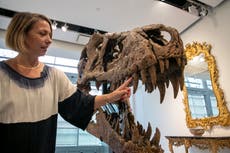AI gives new insight into 93 million-year-old dinosaur footprints
Scientists first believed the giant footprints belonged to a vicious dinosaur predator - but AI indicated otherwise, Mustafa Qadri writes


Artificial intelligence has given new insight into dinosaur footprints dating back 93 million years.
The footprints were first believed to have been created by a vicious dinosaur predator, but AI has helped researchers determine it was actually from a timid herbivore.
Researchers from Australia, Germany, and the UK collaborated and used AI pattern recognition to re-analyse footprints from the Dinosaur Stampede National Monument, in Queensland, Australia.
The AI programme - Deep Convolutional Neural Networks - was trained with 1,500 dinosaur footprints that were relevant to the prints.
Dr Anthony Romilio from Queensland University said: “The mysterious tracks were thought to be left during the mid-Cretaceous Period, around 93 million years ago.
“But working out what dino species made the footprints exactly – especially from tens of millions of years ago – can be a pretty difficult and confusing business.
“Particularly since these big tracks are surrounded by thousands of tiny dinosaur footprints, leading many to think that this predatory beast could have sparked a stampede of smaller dinosaurs.”
The dinosaur footprints were first discovered at the Dinosaur Stampede National Monument in the 1970s.
Lead author of the study from Liverpool John Moores University, Dr Jens Lallensack said that the computer assistance was vital, as the team was originally at an impasse.
“In our research team of three, one person was pro-meat-eater, one person was undecided, and one was pro-plant-eater. So, to check our science we decided to go to five experts for clarification, plus use AI,” he said.
“The AI was the clear winner, outperforming all of the experts by a wide margin, with a margin of error of around 11 per cent.”
The research is published in the Journal of the Royal Society Interface and includes collaborations between Australian, German, and UK researchers.
Join our commenting forum
Join thought-provoking conversations, follow other Independent readers and see their replies
Comments


Bookmark popover
Removed from bookmarks